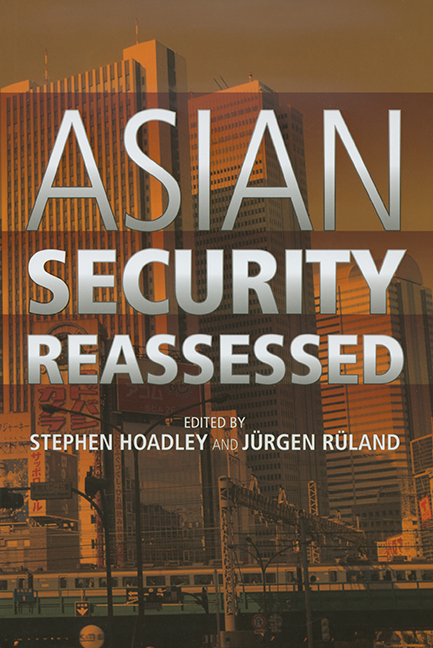Book contents
- Frontmatter
- Contents
- Acknowledgements
- About the Contributors
- List of Abbreviations
- Preface
- Part One Approaches to Asian Security
- Part Two Security Management by Asian States and Regional Institutions
- Part Three Non-Traditional Challenges to Asian Security
- 7 Weapons Proliferation in Asia
- 8 Conflicts over Natural Resources and the Environment
- 9 Ethnic Conflict, Separatism and Terrorism
- 10 Irregular Migration as a Security Issue
- 11 Globalization and Asian Financial Insecurity
- 12 Challenges to Human Rights and Civil Liberties
- Part Four New Concepts of Asian Security
- Index
9 - Ethnic Conflict, Separatism and Terrorism
from Part Three - Non-Traditional Challenges to Asian Security
Published online by Cambridge University Press: 21 October 2015
- Frontmatter
- Contents
- Acknowledgements
- About the Contributors
- List of Abbreviations
- Preface
- Part One Approaches to Asian Security
- Part Two Security Management by Asian States and Regional Institutions
- Part Three Non-Traditional Challenges to Asian Security
- 7 Weapons Proliferation in Asia
- 8 Conflicts over Natural Resources and the Environment
- 9 Ethnic Conflict, Separatism and Terrorism
- 10 Irregular Migration as a Security Issue
- 11 Globalization and Asian Financial Insecurity
- 12 Challenges to Human Rights and Civil Liberties
- Part Four New Concepts of Asian Security
- Index
Summary
INTRODUCTION
Politicized ethnicity “has become the most keen and potent edge of intrastate and inter-state conflict displacing class and ideological conflict, and it asserts itself today, dialectically, as the leading legitimator or delegitimating challenger of political authority”. This statement is as valid today as when Joseph Rothschild made it in 1981. Southeast Asia's “plural societies” — most notably Indonesia and Myanmar, but also Malaysia, the Southern Philippines and Southern Thailand — are particularly exposed to communal strife. In the Philippines and Indonesia, Islam has been a major ingredient in these conflicts, nurturing fears that they may spur Islamist militancy in Southeast Asia, a region known for a diverse but heretofore tolerant Islam.
This chapter seeks to explore the security risks posed by ethnic violence in Southeast Asia. From among a plethora of ethnic conflicts in the region, the conflicts in Aceh and the Southern Philippines have been selected for in-depth study. Both conflicts are driven by Muslim secessionist movements — albeit in one case, the Philippines, against a Christian majority, in the other case, Indonesia, against Javanese dominance, which is equated with a hegemonic Indonesian state. Although the role of Islam as the unifying factor has declined in recent years, Acehnese still perceive Indonesia as a primarily secular state and hence as a threat to their cultural identity which is strongly flavoured by Islam. Both conflicts have centuries-old roots, both have been exacerbated by modernization and globalization and both rage in peripheral regions. After sketching a framework of analysis, the chapter first discusses the underlying causes of these conflicts, and then offers options for conflict resolution. The final section links them to the wider Asian and international security arenas and the post-September 11 developments.
CONCEPTUAL PREMISES
Few concepts are more contested than “ethnicity” and few topics have generated more theoretical approaches than ethnic conflict. Among the multitude of explanations for ethnic conflict we may distinguish the (1) primordialist, (2) political economy and (3) cognitive approaches.
Primordialists use “objective” criteria for defining ethnic identities such as blood relations, race, physical features, language, religion and custom. These commonalities constitute fundamental group identities that have developed over centuries.
- Type
- Chapter
- Information
- Asian Security Reassessed , pp. 211 - 250Publisher: ISEAS–Yusof Ishak InstitutePrint publication year: 2006

